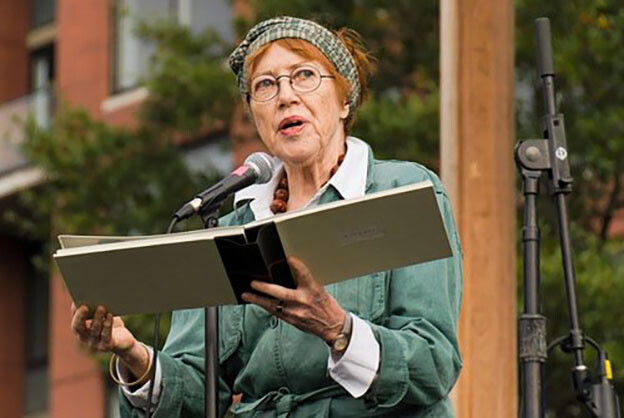
Kathleen Fraser
Sounding Translation episode 1

In this interview, recorded on October 14, 2013, in San Francisco, Kathleen Fraser describes to Teresa Villa-Ignacio her interest in and advocacy for the translation of women poets in her legendary 1980s and early 1990s newsletter, HOW(ever), as well as some of her own translations from the Italian.
While traveling and living in Italy certainly whetted Fraser’s appetite for poetic translation, she first became interested in translation through her work on the groundbreaking newsletter HOW(ever). Her publication of women poets in translation aligned with HOW(ever)’s mission to highlight women’s poetry. She especially wanted to give women poets and their readers an idea of how women’s writing processes worked, which is why she asked all the poets to write “Working Notes” to accompany their texts. As an editor and fellow poet, she was especially interested in the insight the “Working Notes” offered into how poets were thinking about the visual and typographical innovations in their work.
Fraser describes how her literal “translation” from San Francisco to Rome, through her Guggenheim fellowship, became a turning point for her as a feminist poet. The fellowship provided her with much-needed respite from her heavy teaching load and a chance to focus on her work. One day in 1980, she read Yeats’s “Leda and the Swan” and was forever changed by the lines, “Did she put on his knowledge with his power / Before the indifferent beak could let her drop?” This representation of male indifference to female destiny spurred her to create a space for her work and other women’s work, one that she felt was very much absent in the American poetry world at the time. Soon enough, HOW(ever) came to be. She also reveals that the newsletter’s title, HOW(ever), was inspired by Marianne Moore’s line, “I, too, dislike it [poetry], however”: the newsletter both showed how women poets were writing and celebrated however women poets managed to make poetry happen in the midst of their busy lives. After producing five volumes, Fraser passed HOW(ever) on to Myung Mi Kim and Meredith Striker, who published the sixth and final volume.
The interview concludes with readings from Fraser’s translations of Maria Obina’s Lampi e aqua [Light and Water] (1989) and Andrea Raos’s Le api migratori [The Migrating Bees] (2007), as well as her comments on the translation process, especially the pleasure she derives from translating poetry so different from her own.
This podcast was produced by Bridget Ryan, Stonehill College class of 2023, through funding from a Stonehill College 2022 Summer Undergraduate Research Experience (SURE) grant.
Podcasters’ notes:
HOW(ever) has been digitized by ASU Piper Center. Poets in translation in HOW(ever) include Nicole Brossard, Anne-Marie Albiach, Giovanna Sandri, and Jacqueline Risset.
Fraser’s translations of Italian women poets did not appear in Chrysalis but in 13th Moon 11, no. 1–2 (January 1993): 203–29. The poets are Giovanna Sandri, Amelia Rosselli, Toni Maraini, Sarah Zanghi, and Daniela Attanasio. 13th Moon is digitally accessible through JSTOR’s Independent Voices collection of alternative press newspapers, magazines, and journals.
Click here for a transcript of this episode.